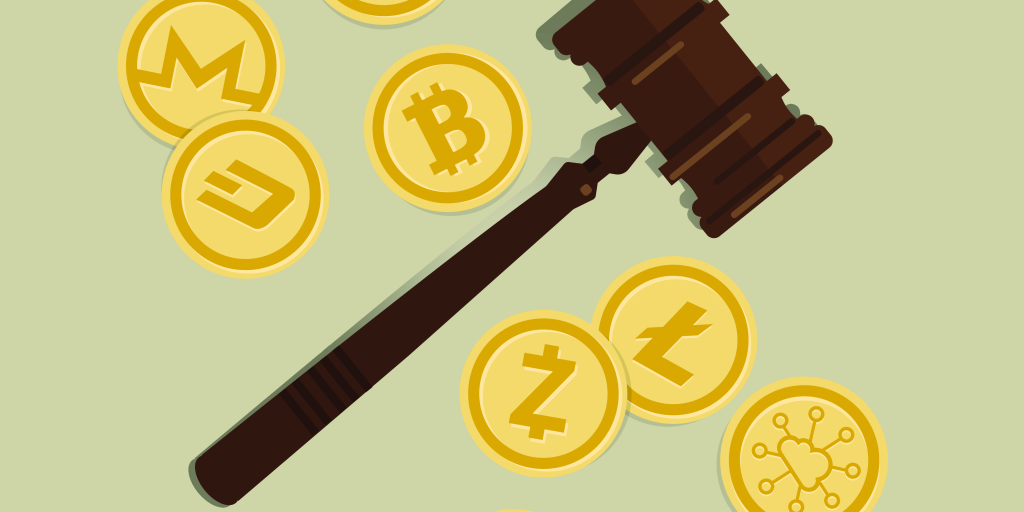U.S. Cryptocurrency Regulations a Work in Progress
BY Dipal Parmar

LISTEN
The rapid growth of bitcoin and other cryptocurrencies in recent years has posed some important regulatory questions. Price volatility, along with large amounts of investor funds being poured into cryptocurrencies, have raised concerns about fraud, pump-and-dump schemes, money laundering and other illegal activities.
Policymakers around the world are taking steps to protect investors while at the same time treading carefully to ensure economic growth is not suppressed.
The United States is currently operating in an uncertain regulatory environment defined by a complex balancing act and lack of clarity. Thus far, government agencies have been debating which existing rules apply to cryptocurrencies as well as whether new laws need to be created.
The U.S. Securities and Exchange Commission (SEC) is a key player in the regulatory landscape. Its approach has the potential to change the way cryptocurrency markets function and how people invest in them. The SEC has implied the need for oversight, while also maintaining that it is not trying to stifle development.
SEC Chairman Jay Clayton has been vocal about cryptocurrency regulation, saying the agency is primarily concerned with protecting investors within its jurisdiction from scams. He argued the SEC’s efforts to combat fraud would help the industry. During a talk at Princeton University on April 5, Clayton said, “I think if we don’t stop the fraudsters, there is a serious risk [of a] regulatory pendulum — the regulatory actions will be so severe that they will restrict the capacity of this new security.”
Several recent cases have highlighted the risks involved with cryptocurrency trading. Earlier this year, the Commodity Futures Trading Commission (CFTC) brought charges against Colorado resident Dillon Michael Dean for soliciting more than $1.1 million in bitcoin from the public under the pretense of investing funds. Staten Island-based CabbageTech was also charged with bitcoin-related fraud and misappropriation. The company failed to provide the real-time trading advice it had promised to customers.
Recently, the SEC has cracked down on cryptocurrency exchanges or online trading platforms, warning investors not to assume that all of them meet the agency’s standards. There have already been instances of fraud and technological vulnerabilities on a number of exchanges.
On April 17, New York Attorney General Eric Schneiderman announced an investigation into at least 13 cryptocurrency exchanges. “Too often, consumers don’t have the basic facts they need to assess the fairness, integrity and security of these trading platforms,” he said. Schneiderman added that he hopes to make exchanges more accountable and transparent. The SEC has stated that exchanges must register with the agency or prove a registration exemption.
SEC regulators are especially concerned about Initial Coin Offerings (ICO) through which new digital currencies are born. They are used for fundraising via cryptocurrency “coins” or tokens. ICOs have experienced stratospheric growth in anticipation of regulatory shifts in the cryptocurrency market. However, they have become synonymous with scandals. Investors could be misled to believe a new coin has significant growth potential only to find out later that it is not backed by anything.
There are currently no reporting requirements for ICOs. In January, the SEC warned cryptocurrency investors to be vigilant and “exercise caution” as many cryptocurrency promoters were not complying with federal and state securities laws. Enhanced SEC regulations in the future could help clean up the space by ensuring accountability. ICOs may be required to register with the SEC prior to filing or to provide consumers with more information. When it comes to ICOs, it appears the agency is likely to enforce existing securities laws where a cryptocurrency meets the established classification of a security.
Regulators have typically classified an asset as either a commodity or security. However, the classification of cryptocurrencies is not clear-cut as they possess the characteristics of both and do not always fit traditional regulatory definitions. The CFTC currently identifies cryptocurrency as a commodity subject to oversight under its authority. During a February 6 hearing, the U.S. Senate Committee on Banking, Housing and Urban Affairs suggested both the CFTC and SEC have a role to play when it comes to cryptocurrency regulation.
The cross-border nature of cryptocurrencies require regulatory coordination. However, differences in approach coupled with little agreement mean the effectiveness of regulation is limited. Some countries have adopted a relaxed attitude toward cryptocurrencies, while others view it as a threat. China has banned ICOs and the majority of cryptocurrency-related activities. On the other hand, Japan recently became one of the first countries to embrace cryptocurrencies as a legal payment method.
Even specific states within the United States are exploring different approaches to cryptocurrency regulation, adding to the existing uncertainty and complexity. For example, Arizona recently passed a measure that permits income tax payments in cryptocurrency form. If more states accept cryptocurrencies as a valid means of payment, the federal government is likely to further step up cryptocurrency regulations.
LATEST STORIES



